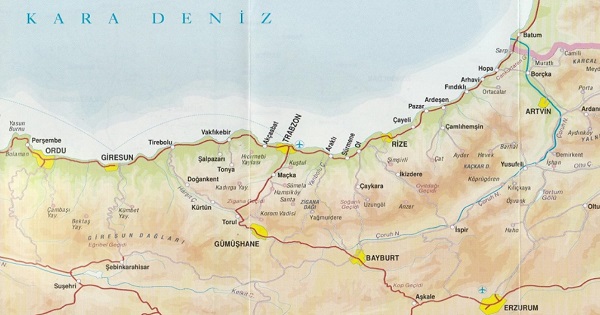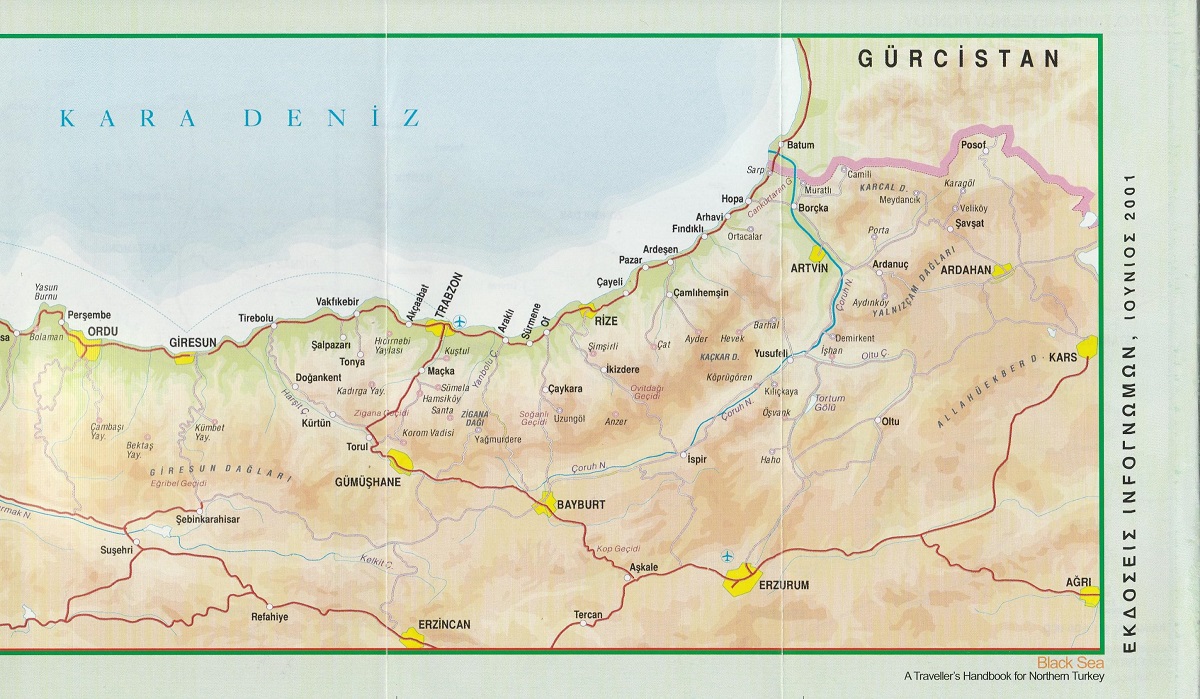
North-east corner of Turkey near the Black Sea (Nişanyan & Nişanyan 2001, p. 217).
By Sam Topalidis
Greeks colonised Pontos in the north-east corner of Anatolia near the Black Sea from at least the 7th century BC (Tsetskhladze 1994). After around 2,500 years of occupation in Pontos the Greeks were expelled from Turkey in the 1920s during the Population Exchange between Greece and Turkey (Note 1). When these Pontic Greeks arrived in Greece most of them spoke Pontic Greek, an old form of the Greek language.
Today, the Pontic Greek dialect spoken in Greece has included terms from Demotic Greek (the modern vernacular form of Greek). The Pontic Greek dialect is still spoken by relatively few Muslim Turks in Pontos, who not exposed to modern Greek terms, speak a ‘cleaner version’ of the dialect called Romeyka. Most of the ancestors of these Muslim Turks were forced to convert to Islam [between the 15th and 18th century]—but they maintained their language (Mackridge 1987).
Pontic Greek is also spoken by descendants of Pontic Greeks in Georgia and Russia. This form of Pontic Greek also varies from the Pontic Greek spoken in Greece and Romeyka still spoken in Turkey due to the addition of local loan words (Berikashvili 2017). Pontic Greek and Romeyka are also spoken in the wider diaspora and they probably have absorbed local terms from the communities in which these people live.
Pontic Greek Dialect in Pontos, Anatolia
In the 11th century when the Seljuk Turks invaded Anatolia, Pontos and the Pontic Greek dialect became isolated from other Greek speaking areas. This would help to explain both the preservation of many medieval characteristics in Pontic Greek spoken today that have disappeared elsewhere and the development of many radically new features that have not appeared in other dialects. There are hundreds of words in Pontic Greek that are unfamiliar to other Greek dialects. There is also a number of archaic words and forms that are preserved in the dialect (Mackridge 1987). So it is not surprising that to Demotic Greek speakers, Pontic Greek is generally incomprehensible.
The most archaic form of the Pontic Greek dialect (Romeyka) has survived among the Muslims from the ‘Of’ region (east of Trabzon, see Figure 1), who were predominantly Christian Greek descendants of this region, who under pressure from the derebeys [valley lords] in the 17th century converted to Islam (Dawkins 1937). In the past, many Turkish settlers near Of became [Pontic] Greek speakers since it was the major local language (Mackridge 1987).
Özkan (2013) states that today Romeyka is spoken in certain villages in the following four parts of the Trabzon region (Figure 1):
- The Tonya district (south-west of Trabzon).
- Beşköy in the Köprübaşi districts (east of Trabzon) in the upper valley of the Manachos River which flows into the Black Sea at Sürmene.
- The Of district (east of Trabzon): in the Çaykara, the Dernekpazari (north of Çaykara) and the Uzungöl districts.
- The Maçka district (south of Trabzon) in the Galyana valley. (These Greek speakers came from Beşköy after 1929.)
The highest concentration of Romeyka speakers also come from the region around Of. Although the number of speakers of Romeyka is decreasing, it remains a preferred means of communication when Romeyka speakers meet (Özkan 2013). 
Figure 1: North-east corner of Turkey near the Black Sea (Nişanyan & Nişanyan 2001, p. 217). (Scale: 90 km Tonya to Uzungöl.)
Sağlam (2017) states that children today do not speak Romeyka with the same proficiency as their Romeyka-speaking parents due to a number of factors which include the growing influence of the Turkish language via television and radio into these once remote villages. In addition, the Turkish language and not Romeyka is taught in schools.
Dr Sitaridou, at: www.romeyka.org/the-romeyka-project/rediscovering-romeyka (accessed October 2018) states that when the Islamisation of many Christians in Pontos took place (15th–18th centuries), the Romeyka of the Muslims was isolated from the Christian Greek speakers. The movement of Muslim Romeyka speakers from the Trabzon region, coupled with the influence of the Turkish-speaking majority, has left Romeyka vulnerable to extinction.
Pontic Greek Dialect in the Former Soviet Union
Pontic Greeks had been emigrating to Russia and the Caucasus from the 18th century up to the Population Exchange (by 1924). In the 20th century and especially in the years following the collapse of the Soviet Union (December 1991), many people of Pontic Greek descent moved from the former Soviet Union to settle in Greece.
Dawkins (1937) stated there were 100,000 Pontic Greek speakers at Rostov on Don in Russia who spoke Pontic Greek consistent with the Pontic Greek spoken in the Gümüşane district (south of Trabzon) so the great mass of them came from this Pontic district. Another feature of the Pontic Greek dialect is the influence of other languages, especially Turkish and in the former Soviet Union, Russian and Caucasian languages as well. Pontic Greek spoken by the Pontic-speaking community of Georgia differs from the other Pontic Greek varieties spoken in Turkey or in Greece, in terms of contact-induced changes. There are a lot of lexical borrowings in Pontic Greek spoken in the former Soviet Union, but it also keeps Turkish borrowings that are inherited from the period Pontic people lived in Anatolia (Berikashvili 2017).
Conclusion
The history and development of the Pontic Greek dialect and Romeyka and how they became distinct from the other Greek dialects should be studied. Recently there has been an effort by Pontic Greek associations in Greece and in the diaspora and in some Greek Universities to teach the Pontic Greek dialect. As a result, the future of the Pontic Greek dialect now looks much brighter. However, the future of Romeyka in Turkey is dire. The future of the Pontic Greek dialect spoken in Russia and Georgia is unknown. It is unknown how many Pontic Greek or Romeyka speakers exist in Greece or Turkey or indeed worldwide today. Are you one of them?
Note 1
In January 1923, Greece and Turkey signed the Lausanne Convention concerning the Population Exchange between Greece and Turkey. This convention stipulated the compulsory exchange of Turkish nationals of the Greek Orthodox religion in Turkish territory and the Greek nationals of the Moslem religion in Greek territory. The Greeks in Constantinople and the Muslims in Western Thrace were exempt from this exchange. The exclusion of the Orthodox inhabitants of the islands of Imbros and Tenedos was specified later in the wider Treaty of Lausanne signed in July 1923 (Hirschon 2008).
Acknowledgement
Thanks to Russell McCaskie for his comments on an earlier draft.
References
Berikashvili, S 2017, Morphological aspects of Pontic Greek spoken in Georgia, Lincom GmbH, Munich.
Dawkins, RM 1937, ‘The Pontic dialect of modern Greek in Asia Minor and Russia’, Transactions of the Philological Society, pp. 15–52.
Hirschon, R 2008, ‘Notes on terminology and orthography’, in R Hirschon (ed.) 2008, Crossing the Aegean: an appraisal of the 1923 compulsory population exchange between Greece and Turkey, Berghahn Books, New York, pp. xi–xiii.
Mackridge, P 1987, ‘Greek-speaking moslems of north-east Turkey: prolegomena to a study of the Ophitic sub-dialect of Pontic’, Byzantine and modern Greek Studies, vol. 11, pp. 115–37.
Nişanyan, S & Nişanyan, M 2001, Black Sea: a traveller’s handbook for northern Turkey, 3rd edition, Infognomon, Athens.
Özkan, 2013, ‘The Pontic Greek spoken by Muslims in the villages of Beşköy in the province of present-day Trabzon’, Byzantine and Modern Greek Studies, vol. 37, no. 1, pp. 1–21.
Sağlam, E 2017, Constitutive ambiguities: subjectivities and memory in the case of Romeika-speaking communities of Trabzon, Turkey, Unpublished PhD thesis in Sociology Psychosocial Studies, Birkbeck, University of London, London.
Tsetskhladze, GR 1994, ‘Greek penetration of the Black Sea’, at www.karalahana.com/english/greeks_black_sea.htm (viewed 2015).
Sam Topalidis (Pontic Historian) 2018
